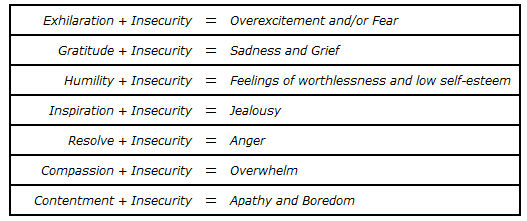
What follows is not a trick question:
Would you rather feel exhilarated, grateful, humble, inspired, resolute, compassionate, and content, or... fearful, sad, worthless, jealous, angry, overwhelmed, and bored?
More to the point, would it surprise you to realize that there was only one difference between the deeper feelings on the first list and the uncomfortable emotions in the second?
One of the many gifts we are given as human beings is the gift of thought, and specifically the ability to imagine things that have not yet happened (and may or may not ever happen). Used one way, imagination allows us to create new possibilities and acts as a stepping stone to creation. Used in another way, it allows us to create feelings of worry, insecurity, and dread in our bodies as we envision all sorts of imminent and eventual disasters in our minds.
The same thing that allows an engineer to design an airplane allows a passenger to imagine that airplane crashing; the same creative element that we use to envision a happy marriage can be used at other times to envision our partner straying and that self-same marriage crumbling under the strain.
In short, the only thing that gets in the way of our experiencing our deeper feelings on a regular basis is the emotional contaminant of our own insecure thinking.
Here's how the misuse of imagination (to create insecure feelings in the body) turns deeper feelings into uncomfortable emotions:

Think about it -- when you are feeling grateful for what you have in your life, you feel wonderful; add in thoughts about how it's all going to disappear (or is already gone and will never come back) and you get to feel miserable and despair.
Admire someone that inspires you and it may well encourage you to find that same strength, beauty, or resourcefulness inside you; add in insecure thoughts about how you'll never be like them and you'll find yourself filled with jealousy and self-loathing.
Happy and content in your marriage? Add in some worry thoughts about how the excitement and passion you once had is gone forever and watch that contentment turn into boredom faster than you can begin taking your partner for granted.
So what do we do about insecure thoughts? If the consequence of insecurity is the contamination of the deeper feelings we all long for and the creation of the emotional states many of us strive to avoid, this would seem to be a pretty important question.
For me, the answer is not in trying to change our behavior or even to control our thoughts, but simply to deepen our understanding of how the whole mechanism works. When I know that feeling emotionally grungy simply means that my thoughts are headed in the wrong direction and my imagination is in negative overdrive, I can take some time out to let my thinking "settle."
I don't have to fix my life, quit my job, dump my partner, or go into therapy -- because no matter how long I've been worrying myself into an emotional mess, I'm only ever one thought away from a deeper peace.
Does that mean it's easy?
Not always. I still get caught up in my own insecure thinking from time to time, and in some ways I've written this post as a reminder for myself. But the more I look for a deeper understanding of how I'm creating my experience of life through my thinking, the more insight I get and the more freedom from the effects of those thoughts I seem to experience.
And when I look behind the content of those thoughts to their source, I occasionally glimpse that space within which thoughts arise and fall. And in that space, I feel both "the peace that passeth understanding" and "the understanding which bringeth peace."
When do you experience that deeper peace? What else have you seen about the power of Thought? Please share your comments in the space below!
With all my love,
Michael
For more by Michael Neill, click here.
For more on emotional intelligence, click here.